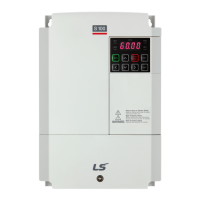Learning Advanced Features
5.31 Brake Control
Brake control is used to control the On/Off operation of electronic brake load system.
Ad
44
Brake open forward
frequency
BR Rls Fwd Fr 1.00
0–
Maximum
Hz
45
Brake open reverse
frequency
BR Rls Rev Fr 1.00
0–
Maximum
Hz
47 Brake close frequency BR Eng Fr 2.00
0–
Maximum
Hz
OU
31
Multi-function relay1
item
Relay 1
35
BR Control:
- -
33
Multi-function output1
item
Q1 Define
When brake control is activated, DC braking (Ad.12) at inverter start and dwell operation (Ad.20–23)
do not operate.
• Brake release sequence: During motor stop state, if an operation command is entered, the
inverter accelerates up to brake release frequency (Ad.44– 45) in forward or in reverse
direction. After reaching brake release frequency, if motor current reaches brake release
current (BR Rls Curr), the output relay or multi function output terminal for brake control
sends a release signal. Once the signal has been sent, acceleration will begin after maintaining
frequency for brake release delay time (BR Rls Dly).
• Brake engage sequence: If a stop command is sent during operation, the motor decelerates.
Once the output frequency reaches brake engage frequency (BR Eng Fr), the motor stops
deceleration and sends out a brake engage signal to a preset output terminal. Frequency is
maintained for the brake engage delay time (BR Eng Dly) and will become 0 afterwards. If DC
braking time (Ad.15) and DC braking resistance (Ad.16) are set, inverter output is blocked after
DC braking. For DC braking, refer to 4.17.2 Stop After DC Braking on page 102
.

